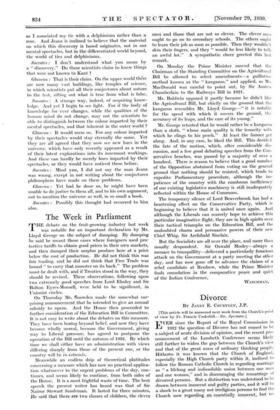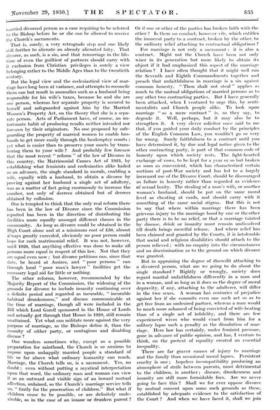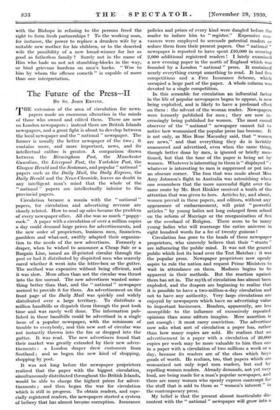Divorce
BY JANET E. COURTNEY, J.P.
[This article will be answered next week from the Church's point of view by Fr. Francis Umicrhill.—En. Spectator.] "FUER since the Report of the Royal Commission in ALA 1912 the question of Divorce has not ceased to be a subject of acute division of opinion, and the recent pro-, nouncement of the Lambeth Conference seems likely still further to widen the gap between the Church's view and that, of the great mass of ordinary thinking people. Hitherto it was known that the Church of England, especially the High Church party within it, inclined to follow the Roman Catholic Church in regarding marriage. as "a lifelong and indissoluble union between one mall and one woman," and in discouraging the remarriage of divorced persons. But a distinction was understood to be drawn between innocent and guilty parties, and it will be a shock to a great many not irreligious persons to find the Church now regarding, an essentially. innocent4. but- re-
married divorced person as a case requiring to be referred to the Bishop before he or she can be allowed to receive the Church's sacraments.
That is, surely, a very retrograde step and one likely still further to alienate an already alienated laity. That divorce, as such, is a sin, and that remarriage in the life- time of even the guiltiest of partners should carry with it exclusion from Christian privileges is surely a view belonging rather to the Middle Ages than to the twentieth century.
But the legal view and the ecclesiastical view of mar- riage have long been at variance, and attempts to reconcile them can but result in anomalies such as a husband being responsible for his wife's taxes, because he and she are one person, whereas her separate property is secured to herself and safeguarded against him by the Married Women's Property Act, on the theory that she is a sepa- rate person. Acts of Parliament have, of course, an un- fortunate habit of producing results neither intended nor foreseen by their originators. No one proposed by safe- guarding the property of married women to enable hus- bands to get more easily through the bankruptcy courts ; yet what is easier than to preserve your assets by trans- ferring them to your wife ? And probably few foresaw that the most recent " reform " of the law of Divorce in this country, the Matrimonial Causes Act of 1923, by establishing what feminists and ecclesiastics alike hailed as an advance, the single standard in morals, enabling a wife, equallY with a husband, to obtain a divorce by proving against her husband a single act of adultery, was as a matter of fact going enormously to increase the number, not only of decrees obtained but of decrees obtained by collusion.
One is tempted to think that the only real reform there has been in the law of Divorce since the Commission reported has been in the direction of distributing the facilities more equally amongst different classes in the community. As long as divorce could be obtained in the High Court alone and at a minimum cost of 150, almost always greatly exceeded, obviously no poor person could hope for such matrimonial relief. It was not, however, until 1920, that anything effective was done to make all persons more equal in respect of this law. Not that they are equal even now ; but divorce petitions can, since that date, be heard at Assizes, and "poor persons" can through local "poor man's lawyer" facilities get the necessary legal aid for little or nothing.
The other reforms, however, recommended by the Majority Report of the Commission, the widening of the grounds for divorce to include insanity continuing over a definite period and regarded as incurable, "incurable habitual drunkenness," and disease communicable at the time of marriage, though all were included in the Bill which Lord Goren sponsored in the House of Lords and actually got through that House in 1920, still remain unattained. Yet what can militate more against the very purpose of marriage, as the Bishops define it, than the insanity of either party, or contagious and disabling disease ?
One wonders sometimes why, except as a possible preparation for sainthood, the Church is so anxious to impose upon unhappily married people a standard of life so far above what ordinary humanity can reach. Marriage, the Church tells us, is a sacrament. Yes, no doubt ; even without putting a mystical interpretation upon that word, the ordinary man and woman can view it as an outward and visible sign of an inward mutual affection, ordained, so the Church's marriage service tells us, "firstly for the procreation of children." But what if children cease to be possible, or are definitely unde- sirable; as in the case of an insane or drunken parent ? Or if one or other of the parties has broken faith with the other ? Is there no conduct, however vile, which entitles the innocent party to a contract, broken by the other, to the ordinary relief attaching to contractual obligations ?
For marriage is not only a sacrament ; it is also a contract. Might not the Church have been not only wiser in its generation but more likely to obtain its object if it had emphasized this aspect of the marriage relation ? I have often thought that it might well run the Seventh and Eighth Commandments together and preach that unfaithfulness in marriage is a sin against common honesty. " Thou shalt not steal " applies as much to the mutual obligations of married persons as to any other two contracting parties. But I have generally been attacked, when I ventured to urge this, by senti- mentalists and Church people alike. To look upon marriage "as a mere contract" is, so they say, to degrade it. Well, perhaps, but it may also be to strengthen it. A very clever solicitor once said to inc that, if you guided your daily conduct by the principles of the English Common Law, you wouldn't go so very far wrong. Surely faithfulness to a contract until you have determined it, by due and legal notice given to the other contracting party, is part of that common code of honesty upon which society rests. The light-hearted exchange of vows, to be kept for a year or so but broken as soon as convenient, which has characterized certain sections of post-War society and has led to a largely increased use of the Divorce Court, should be discouraged as failure in honesty rather than regarded as evidence of sexual laxity. The stealing of a man's wife, or another woman's husband, should be put on the same moral level as cheating at cards, and should carry with it something of the same social stigma. But this is not to say that where within marriage there has been grievous injury to the marriage bond by one or the other party there is to be no relief, or that a marriage tainted by disease, drink or insanity must remain undissolved till death brings merciful release. And where relief has been claimed and granted by the Courts, it is intolerable that social and religious disabilities should attach to the person relieved ; with no enquiry into the circumstances and no discrimination as to the ground on which divorce was granted.
But in appraising the degree of discredit attaching to a divorced person, what are we going to do about the single standard ? Rightly or wrongly, society does regard marital unfaithfulness differently in a man and in a woman, and as long as it does so the degree of Moral depravity, if any, attaching to the adulterer, will differ in the two sexes. A woman has centuries of prejudice against her if she commits even one such act so as to get free from an undesired partner, whereas a man would be much more ashamed of being convicted of wife-beating than of a single act of infidelity, and there arc few experienced wives who would exact from him for a solitary lapse such a penalty as the dissolution of mar- riage. Here law has certainly, under feminist pressure, gone in advance of public opinion, and has, I venture to think, on the pretext of equality created an essential inequality.
There are far graver causes of injury to marriage and the family than occasional moral lapses. Persistent cruelty is one ; hopeless incompatibility producing an atmosphere of strife between parents, most detrimental to the children, is another ; disease, drunkenness and insanity are still more formidable foes. Are we never going to face this ? Shall we for ever oppose divorce by mutual consent upon some such grounds as these, established by adequate evidence to the satisfaction of the Court ? And when we have faced it, shall we join with the Bishops in refusing to the persons freed the right to form fresh partnerships ? To the working man, for instance, the power to replace a drunken wife by a suitable new mother for his children, or to the deserted wife the possibility of a new bread-winner for her as good as fatherless family ? Surely not in the name of Him who bade us not set stumbling-blocks in the -way, or bind grievous burdens on men's backs. "Woe to him by whom the offence cometh " is capable of more than one interpretation.












































 Previous page
Previous page